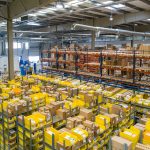You’ll agree with us when we say that the headlines about plastic pollution have been nothing short of alarming in recent years. From once pristine beaches littered with single-use plastics to sea animals tangled in discarded fishing nets, the images are gut-wrenching. Given the urgency of the situation, we have compiled this up-to-the-minute guide on the latest news and actions taken to combat plastic pollution in the UK’s oceans.
The Scope of Plastic Pollution in the UK’s Oceans
Before delving into the steps that are being taken, let’s understand the extent of the problem at hand. The statistics are startling. Each year, an estimated 12.7 million tonnes of plastic end up in our oceans. This waste does not just disappear. Instead, it breaks down into tiny particles called microplastics that cause immense harm to marine life and potentially to humans as well.
Cela peut vous intéresser : What Are the Challenges and Solutions for UK’s Aging Water Infrastructure?
Recent studies have uncovered some alarming facts. For instance, a report revealed that microplastics have been found in the deepest parts of the ocean. Another study showed that 94% of the birds around the North Sea have plastic in their stomach. Yet another news story brought to light how plastic pollution is affecting the UK’s marine national parks.
The UK Government’s Action Against Plastic Pollution
In response to the escalating crisis, the UK government has taken significant action. In the past year, it has passed several laws and regulations to reduce plastic waste and protect the environment.
En parallèle : How to Foster a Reading Culture Among Children in UK Schools?
In a recent announcement, the government revealed a new plan to ban single-use plastics, including plastic straws, cotton buds, and stirrers. The move is expected to eliminate billions of these items from entering the ocean each year. This ban is considered a milestone in the fight against plastic pollution.
Moreover, the UK government has also backed global efforts towards a legally binding treaty on plastic pollution. This treaty, if agreed upon by global leaders, will set international standards for managing plastic waste.
Role of Science and Technology in Reducing Plastic Pollution
Science and technology have also played a crucial role in the fight against plastic pollution. Scientists are researching innovative ways to tackle this issue, from creating biodegradable plastics to developing methods for extracting plastics from the ocean.
One of the most promising developments is the emergence of plastic-eating bacteria. These microscopic organisms can break down and consume plastic, offering a potential solution to the pollution crisis. Another exciting prospect is the use of drones and satellite imagery to map and monitor plastic pollution in the oceans.
On the technology front, several startups have developed apps that can identify and track plastic waste. These tools help individuals and organisations understand their plastic footprint and take steps to reduce it.
The Power of Individual Action
While government regulations and scientific advances are vital, individual actions can make a significant impact. Each year, events like beach clean-ups and awareness campaigns gather momentum.
For instance, the ‘Plastic Free July’ campaign encourages people to eliminate single-use plastics for a month. The goal is to instil habits that last beyond the campaign period. Many individuals, inspired by such initiatives, have started adopting more sustainable lifestyles, opting for reusable options over single-use plastics.
Buying from zero-waste stores, refusing unnecessary plastic packaging, and supporting companies with strong environmental policies are some of the simple ways you can help reduce plastic pollution. Remember, every action counts, no matter how small.
What is the Future of the Fight Against Plastic Pollution?
Looking ahead, the battle against plastic pollution is far from over. However, there is a growing global consensus for stronger action. The UK, along with other countries, is pushing for a global treaty on plastic pollution. If successful, this treaty will be a game-changer.
At the same time, technological advances will continue to play a pivotal role. From plastic-eating bacteria to AI-powered waste management systems, the potential for innovative solutions is immense.
Lastly, the shift towards a circular economy, where waste is minimised and resources are continuously reused, holds significant promise in reducing plastic pollution. The responsibility, however, lies with all of us – governments, industries, and individuals – to turn this vision into reality. After all, the health of our oceans and the future of our planet depend on it.
The Impact of Businesses and Corporations on Plastic Pollution
Corporations and businesses also play a significant role in the plastic pollution epidemic. These entities are often the source of large amounts of plastic waste, from packaging materials to disposable products such as plastic straws, bottles, and bags. However, many companies have started to recognise the need to combat plastic pollution and are taking significant strides towards sustainability.
In recent science news, several corporations have pledged to drastically reduce their single-use plastics. This is often achieved through various strategies, such as substituting plastic packaging with eco-friendly alternatives or implementing recycling schemes. For instance, many food and beverage companies are now using biodegradable alternatives to plastic straws and are encouraging customers to bring their own cups or bottles.
Moreover, some businesses are going beyond reducing their own plastic waste and are using their influence to inspire change in others. For example, numerous companies have launched campaigns to raise awareness about plastic pollution, and have donated to environmental causes.
Additionally, there is a growing trend of ‘zero waste’ stores. These shops sell items without any plastic packaging, and customers are encouraged to bring their own containers. This concept is helping consumers to reduce their own plastic waste and is showing that a plastic-free lifestyle is feasible.
However, it’s important to be mindful that not all environmental claims made by companies are truthful. This phenomenon, known as ‘greenwashing’, can mislead consumers into thinking they are making environmentally friendly choices when they are not. Always research and support companies that have legitimate environmental policies and are transparent about their sustainability efforts.
The Effectiveness of Current Measures and the Road Ahead
It is undeniable that the fight against plastic pollution has gained significant momentum. From government regulations and scientific innovations to individual actions and corporate responsibility, the efforts are widespread and multifaceted.
However, it’s equally undeniable that there is still a long way to go. Despite the progress made, the amount of plastic in our oceans continues to rise, climate change is exacerbating the problem, and plastic waste remains a pressing issue.
What’s crucial is that the momentum gained in recent years doesn’t slow down. The ban on single-use plastics needs to be adopted more widely and enforced strictly. Scientific research into plastic-eating bacteria and other innovative solutions should be funded and supported. Individuals need to continue making sustainable choices, and businesses should be held accountable for their environmental impact.
In conclusion, while the fight against plastic pollution is undoubtedly a daunting task, it is not impossible. The collective efforts of governments, scientists, individuals, and corporations can and will make a difference. There is hope on the horizon. The fight against plastic pollution in the UK’s oceans is far from over, but with continued commitment and action, a plastic-free ocean is not just a dream, but a very real possibility.











